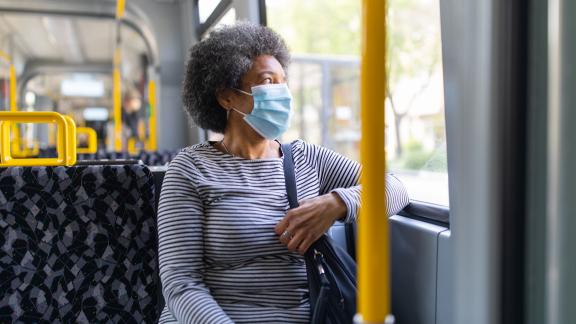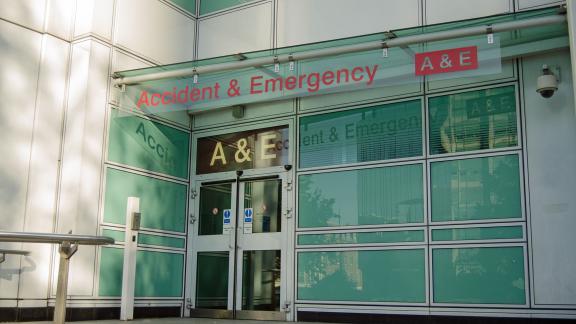Complacent government messaging risks fight against COVID-19

The government’s complacent public health messaging and resistance to reintroduce measures that prevent the spread of the COVID-19 are risking the UK and the NHS being plunged back into crisis.
The danger of success is that it can breed complacency and we are seeing this now with the government’s handling of the pandemic.
After leading one of the world’s earliest and most successful rollouts of the vaccine, our immunity levels are starting to wane and the health and social care secretary predicts COVID-19 cases could soon hit 100,000 a day.
Against this backdrop, the government is resisting calls to reintroduce mask wearing or to require vaccine passes for large public gatherings. And this is being compounded by a lack of political leadership when it comes to advising the public to be cautious when mixing in public.
Communication is key
The government doesn’t yet think it’s the right moment to enact ‘Plan B’, as the NHS Confederation called for last week. But it’s clear that the government needs to regain focus if we are to avoid stumbling into a crisis this winter.
The quadruple threat of rising COVID-19 cases, rapidly rising demand for urgent and emergency care, a huge backlog of elective care, and high staff absence due to sickness will make this a perilous winter.
We need the government to do everything in its power to encourage the public to remember the lessons of the first and second waves of the virus.
There are many aspects of the pandemic response that now need to be fired up again, not least in terms of how we communicate to the public. This has been a key weapon in our armoury from day one of the pandemic but it’s one the government has let slip in recent months.
How the virus spreads over the winter will largely be down to individual behaviours and choices. For example, will more of the 5 million UK adults who remain unvaccinated finally come forward for their first jab? Will the remaining just over half of those eligible for the booster jab get their third jab? And will more of the public go back to the effective individual behaviours, such as mask wearing, washing hands regularly and maintaining social distancing, that helped to keep the virus under a semblance of control?
The answers to these questions hold the key to how severe this winter is likely to be. And that’s why we need the government to do everything in its power to encourage the public to remember the lessons of the first and second waves of the virus.
Ramp up public messaging
As an immediate first step, the government should ramp up the national public information campaign that it led earlier this year to boost take-up of the vaccine. The ‘every vaccination gives us hope’ campaign was highly successful, with adverts running across television, radio, print, social media and billboards in prominent places. It looks as though this will return as part of a ‘boost your immunity this winter’ message, which will help us recover lost ground in the take-up of the booster vaccine.
The optics of ministers gently advising the public to wear face coverings while choosing not to do so themselves in the House of Commons is undermining efforts to encourage greater public adherence.
More targeted and sustained communications are also required to reach the 5 million adults in the UK who remain unvaccinated. Some of these won’t be persuaded of course, but making in-roads into that substantive cohort will have a major bearing on COVID-19 infection rates and hospital admissions this winter.
We also need to see clear and consistent public health messaging from the government that encourages the public to wear face coverings, wash their hands regularly and maintain social distancing where possible. The government’s libertarian messaging on these factors has no doubt contributed to the low levels of adherence we are seeing on public transport, in supermarkets and in other public places. The optics of ministers gently advising the public to wear face coverings while choosing not to do so themselves in the House of Commons chamber is undermining these efforts to encourage greater public adherence. As a first step, it was pleasing to see the health and social care secretary wearing a mask during the Autumn Budget and Spending Review debate earlier this week.
Precautionary steps now will mitigate risk
The vaccine offered us a way out of the pandemic, but complacent public health messaging from the government and low take-up of the booster vaccine risks plunging us back into crisis.
Ultimately, this is not just a case of preventing the NHS from being overwhelmed, as some commentators like to frame the debate. It is about taking all the precautionary steps we can now to mitigate the risks of the virus spreading to levels that would end up requiring more draconian measures. And as an important by-product, keeping COVID-19 infection rates and hospital admissions low will also boost the NHS’s efforts to reduce the backlog of care that has built up.
The vaccine offered us a way out of the pandemic, but complacent public health messaging from the government and low take-up of the booster vaccine risks plunging us back into crisis. It’s vital that the government goes back to the effective public information campaigns, and clear and consistent messaging on individual behaviour, that played such a vital role in turning the tide on the virus.
This article was first published in PR Week on 26 October 2021.
Daniel Reynolds is director of communications at the NHS Confederation. You can follow Daniel on Twitter @DanielReynolds4



